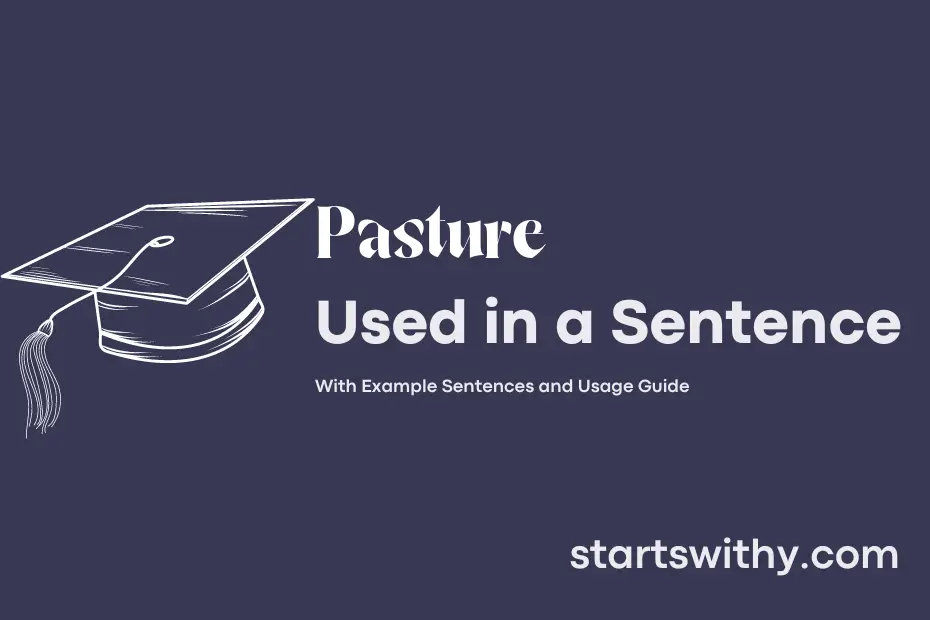Do you know what “pasture” means? In simple terms, a pasture refers to a piece of land covered with grass or other plants where animals graze.
This area is specifically designated for livestock to feed on the vegetation, providing them with nourishment and sustenance.
7 Examples Of Pasture Used In a Sentence For Kids
- The pasture is where cows and horses graze.
- Sheep love to eat grass in the pasture.
- A pasture is like a big, green field.
- Farmers feed their animals in the pasture.
- Sun shines on the pasture all day.
- Birds sometimes visit the pasture for seeds.
- I like to run and play in the pasture with my friends.
14 Sentences with Pasture Examples
- Pasture is essential for livestock farming in rural areas.
- The cows were happily grazing in the pasture.
- We conducted a field trip to observe the different types of pasture used for animal grazing.
- The agriculture students studied the techniques for maintaining a healthy pasture.
- The farmer’s main source of income was the large pasture he owned.
- We learned about sustainable practices for managing pasture during our environmental science class.
- The ecology professor discussed the biodiversity found in natural pasture lands.
- The veterinary students practiced identifying different types of grasses commonly found in pasture.
- The debate on land conservation vs. urban development often mentions the importance of protecting pasture land.
- The economics students analyzed the impact of changing pasture prices on the livestock industry.
- The environmental studies department hosted a seminar on the role of pasture in maintaining ecosystem balance.
- The botany students collected samples of grass from the nearby pasture for their research project.
- The sociology students examined the cultural significance of pasture in rural communities.
- The students were required to volunteer at a local farm to learn more about pasture management.
How To Use Pasture in Sentences?
Pasture is a noun that refers to a piece of land covered with grass or other plants suitable for grazing animals. When using pasture in a sentence, it is important to remember that it is a singular noun, so it should be paired with singular verbs and pronouns.
For example, you can say, “The cows were grazing in the pasture.” In this sentence, “pasture” is used to describe the land where the cows are feeding.
When using pasture in a sentence, it is helpful to provide context so the reader understands how the word fits into the overall meaning. For instance, you could say, “The rancher led the horses out to the pasture to graze.”
Additionally, you can use pasture as part of a compound noun, such as “pastureland” or “pasture management.” For example, “The farmer practiced sustainable pasture management to ensure the health of his livestock.”
Remember, pasture can also be used as a verb, meaning to put animals out to feed in a pasture. For example, “The farmer pastured his sheep in the field.”
By following these guidelines and examples, you can effectively incorporate pasture into your sentences with clarity and precision.
Conclusion
In conclusion, the examples of sentences with the keyword “pasture” demonstrate various uses of the word in different contexts. From describing animals grazing in lush pastures to discussing the care and maintenance of these open fields, the word “pasture” signifies a vital aspect of agriculture and animal husbandry. Additionally, the term can also be applied in a figurative sense to convey notions of freedom, abundance, and natural beauty.
Overall, the keyword “pasture” serves as a versatile word that captures the essence of rural landscapes, livestock management, and pastoral scenes. Its flexibility allows for a range of interpretations and vivid descriptions, making it an integral part of language when discussing agriculture, nature, and the countryside.



